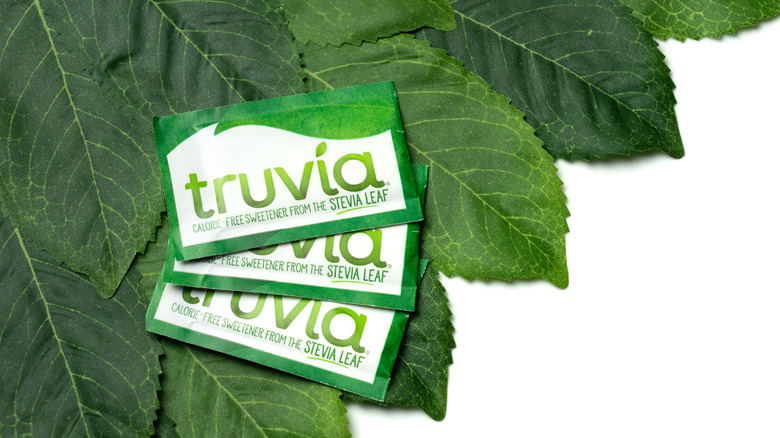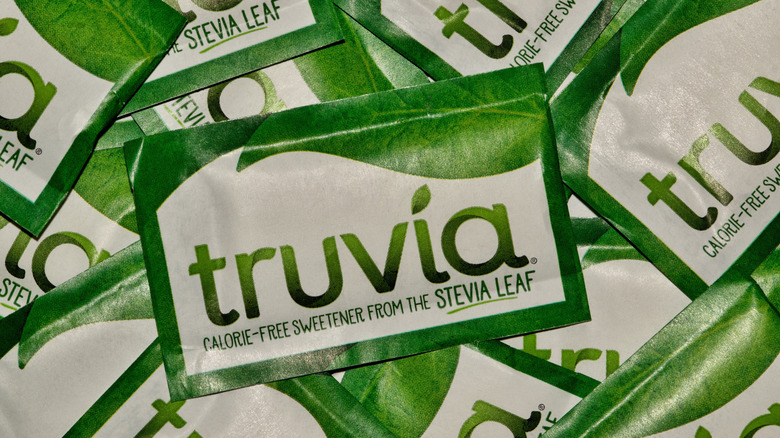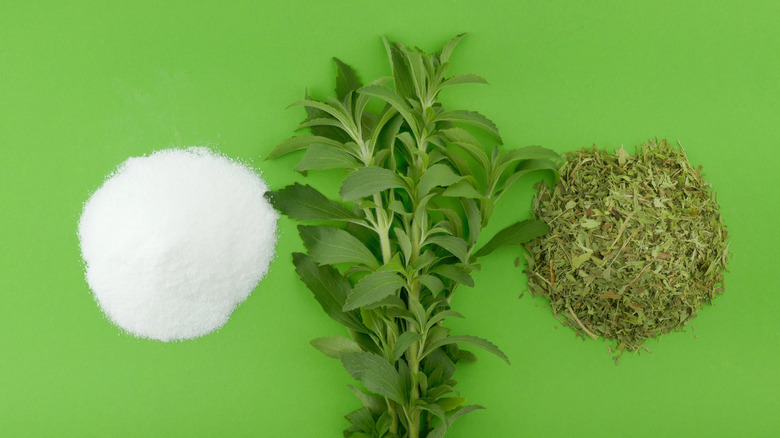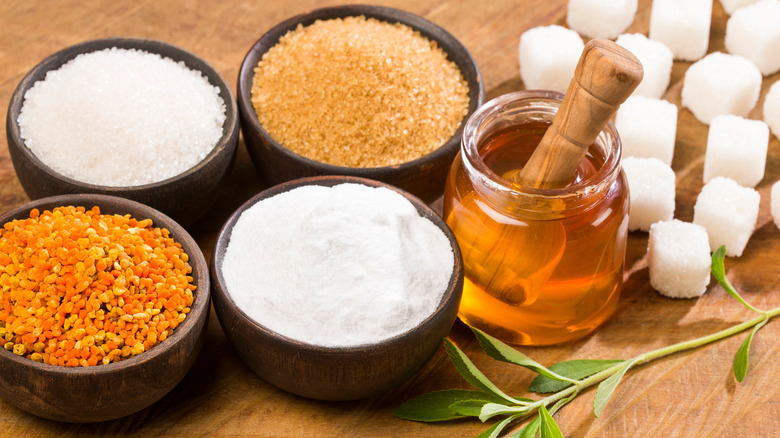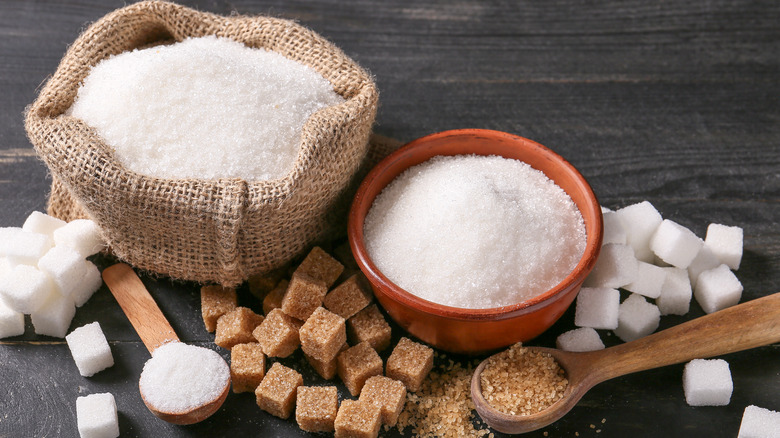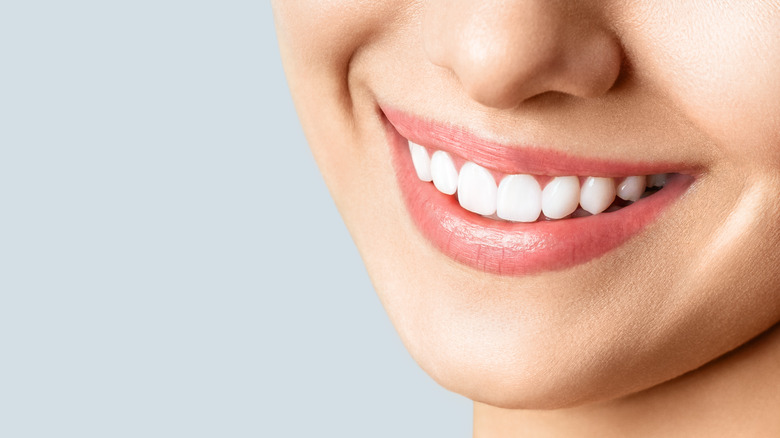Truvia Vs Stevia: What's The Difference?
There's been a huge increase in options for sugar replacements in recent years, with more and more nonnutritive sweeteners like Truvia and stevia coming to market that can help replace sugar in coffee, baking, and other cooking scenarios. According to the USDA, "nonnutritive sweeteners are very low in calories or contain no calories at all" and can be added to both food and beverages. They're also a good option if you're looking to decrease your daily sugar intake.
The American Heart Association suggests an "added sugar limit of no more than 100 calories per day (about 6 teaspoons or 24 grams of sugar) for most women and no more than 150 calories per day (about 9 teaspoons or 36 grams of sugar) for most men," which can be easy to overdo. However, using Truvia or stevia instead will have no effect on blood sugar levels, and neither will cause cavities the way sugar does (per Healing Teeth Naturally). Though they are similar, there are some things to know about the two that set them apart.
What is Truvia?
Truvia is basically a brand name alternative sweetener that is partly sourced from the stevia plant. According to the official website, Truvia is a blend of erythritol, stevia leaf extract, and natural flavors. The combination of the erythritol and stevia in Truvia helps keep the sweetness more evenly distributed and less intense than pure stevia leaf extract as, in its raw form, it can sometimes have a bitter aftertaste.
So what is erythritol? It's one of several sugar alcohols that have become popular as a sugar substitute. According to Clean Plates, it can be a natural component of fruits, mushroom fungi, and even soy sauce or wine, "but commercial erythritol is often made from enzymatically hydrolyzed corn starch or wheat ... this creates glucose, which is then fermented into erythritol." While it has been approved by the FDA as safe for human consumption, too much can have laxative effects or cause bloating and gas, per Clean Plates.
So Truvia is neither pure stevia nor pure erythritol, but a blend of both, though Livestrong says it only has about 1% stevia extract.
What is stevia?
Stevia is the common name for extracts from the plant Stevia rebaudiana. These sugar substitutes have virtually no calories and are deemed safe for consumption by the FDA, though the leaf itself and crude extracts are not allowed in the United States. Mayo Clinic writes that "The FDA hasn't approved whole-leaf stevia or crude stevia extracts for use as food additives because of concerns about possible health effects." These can include effects on blood sugar control, the cardiovascular and reproductive systems, and the kidneys.
According to Clean Plates, there are two "steviol glycosides" that make the leaves of the plant so sweet. "Stevioside is sweet, but it has a bitter aftertaste which some people find unpleasant. Rebaudioside is sweet with no bitterness, which is why you'll often see rebaudioside in stevia products. Raw or minimally processed stevia will likely contain both."
Stevia has been used in South America not only as a sweetener but also a medicinal agent for hundreds of years (via Clean Plates), and has been introduced to the US in more recent years. This sugar alternative is up to 400 times sweeter than sugar, so you'll only need a fraction of the recommended amount if you're adding it to baked goods or other items.
Is Truvia or stevia better for diabetics?
While there isn't much researched information about whether or not Truvia or stevia is better for diabetics to use as a replacement sweetener, several websites hosted and written by diabetics seem to prefer stevia over Truvia. Diabetes Strong chooses stevia as a sweetener of choice as they claim it won't raise blood sugar levels.
Vitagene also writes that "stevia does not cause glycemic responses and has been shown to reduce blood sugar levels. It also reduces insulin sensitivity." Similar reports and reviews from diabetics using Truvia are less common, which may infer that stevia is a slightly better option, though both are nonnutritive sweeteners, and according to Every Day Health, nonnutritive sweeteners in general have little to no impact on blood sugar.
If you are diabetic and trying to decide, you could test out both options for yourself to see if you have a preference for one over the other, as the taste can also vary slightly, and you can check to see if you have reactions to either before buying in large quantities.
Which tastes most similar to real sugar?
If you're baking with artificial sweeteners or putting them in your coffee, you probably want whichever one tastes most similar to sugar. According to an in-house test conducted by The Daily Meal, they found that Truvia was the nonnutritive sweetener that tasted the most similar to sugar, though it should be known that plain stevia was not tested in this test.
In another post by Very Well Fit, the site reached out to various dietitians asking whether they prefer Truvia or stevia for their own personal use. Of the four dietitians consulted, all of them reported that they prefer stevia over Truvia as a sugar alternative. One dietitian, Karen Gillespie, gave this reasoning behind her preference: "Truvia is a bit more processed and has additional ingredients including erythritol and natural sweeteners." She went on to comment that there are minimal differences between the two otherwise.
There is still little information regarding whether Truvia or plain stevia more closely resemble sugar, so conducting a personal taste test may be a good idea before deciding if you want to commit to replacing sugar with one of these sweeteners.
Which is better on the teeth?
When it comes to which one is better on the teeth, it seems that both stevia and Truvia have their dental benefits and have been seen to reduce the chances of getting cavities. According to Dentistry With A Heart, this is because nonnutritive sweeteners are missing of the main components that can lead to tooth decay — carbohydrates. As they note, "tooth decay is a multifaceted process that requires two main ingredients: specific bacteria already residing in our mouths, and fermentable carbohydrates such as sugars and starches. When the two meet, the bacteria metabolizes these carbohydrates into organic acids which will begin the erosion of enamel. Although stevia extract is sweet, it does not contain fermentable carbohydrates."
Furthermore, Truvia's UK website notes a study originally presented in July 2010 at the International Association for Dental Research that shows the sweetener does not lower dental plaque pH, which is important for the structure of teeth. According to Dental Care, "after exposure of dental plaque to fermentable carbohydrates, the pH decreases rapidly."
It would stand to reason then that both stevia and Truvia are a better option than sugar when it comes to dental health as well.
